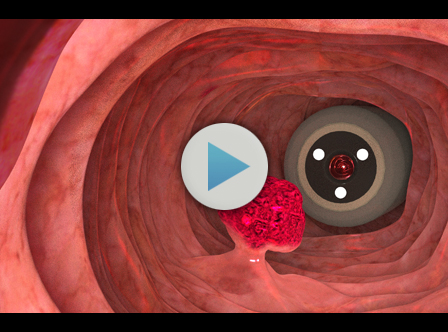PROJECTS
The technology centre is currently collaborating with Universitat Pompeu Fabra and a company called MiWEndo Solutions to develop a new functional prototype for a medical device that complements optical endoscopic systems by means of an innovative microwave method designed to increase the success rate of these diagnostic tests.
In Spain, colorectal cancer is associated with the highest number of diagnoses: in 2017 more than 34,300 people were diagnosed with this pathology that accounted for 15% of the total figure of cancer-related pathologies according to the Observatorio de la Asociación Española Contra el Cáncer (the Observatory of the Spanish Association Against Cancer). Although colonoscopies nowadays provide the most efficient detection method, this test has viewing constraints meaning that 22% of the polyps are not detected.
In order to improve the effectiveness of this diagnostic test, Tekniker, member of the Basque Research and Technology Alliance (BRTA), is collaborating with Universitat Pompeu Fabra in Barcelona and MiWEndo Solutions to develop a functional prototype for a medical device that can detect colon polyps by means of an innovative microwave technique.
The ultimate goal of this project is to incorporate microwave-based images to conventional colonoscopies to increase the success rate of diagnostic tests. This integration has been carried out by means of an aerial applicator designed to prevent microwave interference from affecting the optical viewing systems situated on the tip of the endoscope whilst maintaining patient safety and guaranteeing ease-of-use for endoscopists. Said applicator is connected to an external unit via coaxial and signal cables. The unit generates microwave and control signals for the aerial’s input and switching and shows the results of the examination.
Tekniker has been specifically asked to develop the casing covering the microwave detection system so that it can be attached and secured to any type of commercial endoscope and complement its visual detection properties. In order to guarantee functionality and operativity, biocompatible materials must be used for the casing and total waterproofing must be provided to stop fluids from the colon seeping inside the device and affecting its internal components.
Tekniker has primarily focused on the technical requirements defined by the company MiWEndo Solutions to develop the initial prototypes and run a number of laboratory tests.
Once these models have been fully tested, the Basque technology centre will develop a functional prototype so that MiWEndo Solutions may perform the first preclinical tests. The end results of these tests will allow them to make all the necessary improvements to design the final prototype.
Tekniker’s high level of specialisation in the design and development of the prototype together with its capabilities in terms of concept optimisation, manufacturing, commissioning and validation have made it possible to develop integral solutions of the kind described herein.



